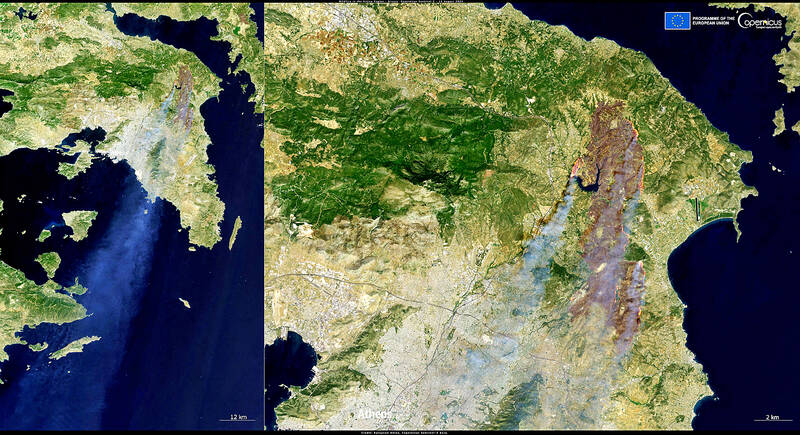This year’s northern hemisphere summer saw the highest global temperatures on record, beating last year’s high and making this year likely Earth’s hottest ever recorded, the EU’s climate monitor said yesterday.
The data from the Copernicus Climate Change Service followed a season of heat waves around the world that scientists said were intensified by human-driven climate change.
Extreme weather struck around the globe — with about 1,300 dead during extreme heat at the hajj in Mecca, intense heat testing India’s economy and electricity system, and wildfires raging in parts of the western US.

Photo: EU / Copernicus Sentinel-2 via Reuters
“During the past three months of 2024, the globe has experienced the hottest June and August, the hottest day on record, and the hottest boreal summer on record,” Copernicus deputy director Samantha Burgess said in a report. “This string of record temperatures is increasing the likelihood of 2024 being the hottest year on record.”
The average global temperature at the Earth’s surface was 16.82°C last month, according to Copernicus, which draws on billions of measurements from satellites, ships, aircraft and weather stations.
That saw the global temperature break through the level of 1.5°C above the preindustrial average — a key threshold for limiting the worst effects of climate change.
Human-caused greenhouse gas emissions are warming the planet, raising the likelihood and intensity of climate disasters such as droughts, fires and floods.
Heat was exacerbated last year and early this year by the cyclical weather phenomenon El Nino, although Copernicus scientist Julien Nicolas said its effects were not as strong as they sometimes are.
Meanwhile, the contrary cyclical cooling phenomenon, known as La Nina, has not yet started, he said.
A study published last month estimated that 30,000 to 65,000 people in Europe died from heat-related illnesses last year.
Against the global trend, regions such as Alaska, the eastern US, parts of South America, Pakistan and the Sahel desert zone in northern Africa had lower than average temperatures last month, the report said.
However, other regions such as Australia — where it was winter — Japan and Spain experienced record warmth.
China logged its hottest August in more than six decades last month, its national weather service said, after the nation endured a summer of extreme weather and heat waves across much of its north and west.
China is the leading emitter of greenhouse gases, but with Beijing installing renewable capacity at record speed, and a construction slump dragging down emissions-heavy steel production, there are signs the nation could hit its peak early, experts say.
“The temperature-related extreme events witnessed this summer will only become more intense, with more devastating consequences for people and the planet unless we take urgent action to reduce greenhouse gas emissions,” Burgess said.

GAINING STEAM: The scheme initially failed to gather much attention, with only 188 cards issued in its first year, but gained popularity amid the COVID-19 pandemic Applications for the Employment Gold Card have increased in the past few years, with the card having been issued to a total of 13,191 people from 101 countries since its introduction in 2018, the National Development Council (NDC) said yesterday. Those who have received the card have included celebrities, such as former NBA star Dwight Howard and Australian-South Korean cheerleader Dahye Lee, the NDC said. The four-in-one Employment Gold Card combines a work permit, resident visa, Alien Resident Certificate (ARC) and re-entry permit. It was first introduced in February 2018 through the Act Governing Recruitment and Employment of Foreign Professionals (外國專業人才延攬及雇用法),

WARNING: From Jan. 1 last year to the end of last month, 89 Taiwanese have gone missing or been detained in China, the MAC said, urging people to carefully consider travel to China Lax enforcement had made virtually moot regulations banning civil servants from making unauthorized visits to China, the Control Yuan said yesterday. Several agencies allowed personnel to travel to China after they submitted explanations for the trip written using artificial intelligence or provided no reason at all, the Control Yuan said in a statement, following an investigation headed by Control Yuan member Lin Wen-cheng (林文程). The probe identified 318 civil servants who traveled to China without permission in the past 10 years, but the true number could be close to 1,000, the Control Yuan said. The public employees investigated were not engaged in national

The zero emissions ship Porrima P111 was launched yesterday in Kaohsiung, showcasing the nation’s advancement in green technology, city Mayor Chen Chi-mai (陳其邁) said. The nation last year acquired the Swiss-owned vessel, formerly known as Turanor PlanetSolar, in a bid to boost Taiwan’s technology sector, as well as ecotourism in Palau, Chen said at the ship’s launch ceremony at Singda Harbor. Palauan President Surangel Whipps Jr and Minister of Foreign Affairs Lin Chia-lung (林佳龍) also attended the event. The original vessel was the first solar-powered ship to circumnavigate the globe in a voyage from 2010 to 2012. Taiwan-based Porrima Inc (保利馬) installed upgrades with

ENHANCE DETERRENCE: Taiwan has to display ‘fierce resolve’ to defend itself for China to understand that the costs of war outweigh potential gains, Koo said Taiwan’s armed forces must reach a high level of combat readiness by 2027 to effectively deter a potential Chinese invasion, Minister of National Defense Wellington Koo (顧立雄) said in an interview with the Chinese-language Liberty Times (sister newspaper of the Taipei Times) published yesterday. His comments came three days after US Secretary of State Marco Rubio told the US Senate that deterring a Chinese attack on Taiwan requires making a conflict “cost more than what it’s worth.” Rubio made the remarks in response to a question about US policy on Taiwan’s defense from Republican Senator John Cornyn, who said that Chinese